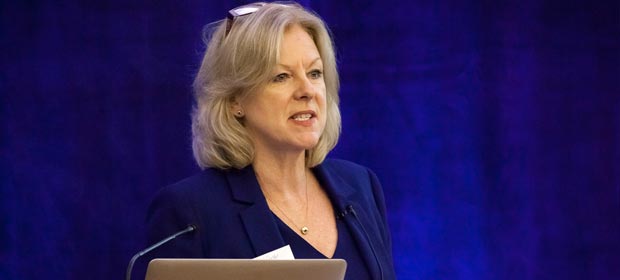A Health Service Journal Leadership survey had shown that while safety and reducing harm and delivering integrated care were stated priorities, 50 per cent of respondents were not confident that a Mid Staffs type event would not happen, Ms. Shirley Cramer, CBE. Chief Executive, Institute of Healthcare Management and the Royal Society for Public Health told the Conference.
The Health Service Journal leadership survey showed that while safety and reducing harm and delivering integrated care were stated priorities, 50 per cent of respondents were not confident that a Mid Staffs type event would not happen, Ms. Shirley Cramer, CBE, Chief Executive, Institute of Healthcare Management and the Royal Society for Public Health told the Conference.

Speaking on “Leadership and Culture,” she said that the survey also showed a lack of middle management development.
Two other surveys dealing with leadership and culture in the health services which were published this year had highlighted barriers to improving the quality of patient care and characteristics of poor practice.
The Kings Fund Leadership Survey published in May 2013 stated that “limited resources and organisatonal culture were the most significant barriers to improving the quality of patient care and there was a need to shift the culture from externally focused targets to patients first.
The Culture and Behaviour in the English NHS study which reported in September this year was a four year multi method study, involving six universities, which looked at the way things were being done in different centres, by GPs and in hospitals.
It found a lot of good practice but also found characteristics of poor practice were staff who were distracted and harassed, preoccupied with bureaucracy, a service which was care task focused not person centred, a low level of staff engagement and patients who were ill informed or distressed.
Characteristics of poor practice were staff who were distracted and harassed, preoccupied with bureaucracy.
It found we needed to get away from a culture overly focused on regulation, supervision, and direction and punishment and ‘priority thickets.’ A proliferation of multiple, externally set priorities, dense patches of overlapping or disjointed goals did not provide direction, goals or strategies related to local priorities.
Ms. Cramer said leadership meant patients first and the values of care and compassion, dignity and respect, openness, honesty, responsibility, quality and teamwork.
Change should be based on clear vision, explicit goals for quality and safety and patient engagement. Staff should be engaged in organisational development, teams should be integrated and staff supported, respected, valued and developed.
Leadership meant people first and its values were care and compassion, dignity and respect, openness, honesty, responsibility, quality and teamwork.
Leadership should be seen as a “social process” a commitment to innovation and quality improvement, a culture to learn what worked and what did not work, a willingness to listen and ask questions and to look at collaborative solutions.
She said that when she worked in the US they were allowed to make mistakes and if they didn’t they were told they weren’t working hard enough. “I see a fear about making mistakes, you might be shouted at and feel a failure. People should have the freedom to say let’s try it this way and mitigate the risks.”
Turning to the recruitment of doctors she said that some places in Cleveland, Ohio, were giving champagne receptions for young doctors and showing them the beautiful housing available in a bid to attract them to the area and apparently it was a very successful strategy.
The Institute of Healthcare Management, which has 3,500 members, is the largest representative organisation for individual healthcare mangers in the UK from within the NHS primary and secondary care and private independent, commercial health and care sectors at all levels.
Its objectives are to enhance and promote high standards of professional heath and care management in order to improve health and healthcare of the population.
It was a voice and advocate for health and social care managers, ‘a constant career companion,’ it supported networks and partnerships and identified, promoted and shared best practice.
She said the challenges were similar everywhere – every country was seeing the same kind of austerity, with increasing demands for service, increasing ageing populations and more high tech treatment.
The Royal Society for Public Health is an independent multi-disciplinary organisation to promote and protect the public’s health and well being. It provides education and training services, research and policy development and has 6,000 members and provides a lot of advice on policy development.

